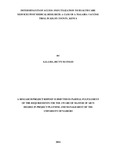| dc.description.abstract | Health care is acknowledged as one of the basic rights of every human being. Different
strategies have been recognized to ensure improvement in health care. Some of the
strategies employed by different governments include medical research to enhance the
search of appropriate interventions. However, despite the strategies put in place, studies
have shown that uptake of the developed interventions has been way below expectations.
Empirical findings have identified different factors that could determine uptake of the
services to the targeted population. These factors include knowledge, attitude and cultural
values and beliefs in relation to the health problem and recommended service;
affordability, accessibility, perceived quality of care as well as the attitudes of health care
services providers; distance from health care facility, household income, authoritative
sources of information among others. Medical research projects conducted in Health
Facilities (HF) especially in developing countries often provide support in form of
construction or expansion of facility buildings, hire additional staff and provide improved
quality of care (ambulatory services, skilled staff) and these could benefit all facility
users. In resource poor settings, studies have shown that individuals join health research
to utilize health care services, often provided for free in studies especially in context of
vast unmet health needs. Consequently, exit of research projects have the potential to
impact negatively on the healthcare services uptake when project resources and services
are removed. Little is known about the potential effects when research projects are
withdrawn especially on the access and utilization of health care services, hence the need
for more empirical work. This project, focussed on the determinants of access and
utilization of health care services after the exit of a Malaria vaccine trial, which was
carried out by Kenya Medical Research Institute/Wellcome Trust Research Programme
(KWTRP) in Kilifi County. Objectives of the study were to establish how economic
factors, quality of care and cultural values and beliefs determined access and utilization
of health care services post medical research. The study was carried out in Madamani
community which had participated in the malaria vaccine trial. It involved a sample of 22
respondents who took part in In-depth interviews, Focus Group Discussions and filling
questionnaires. It employed a descriptive survey research design. The study identified
economic factors, quality of care, severity of illness as well as cultural values and beliefs
as key determinants for access and utilization to health care services after the exit of a
trial | en_US |

